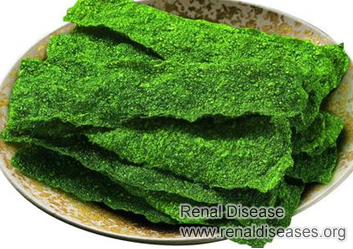Whatsapp: +8615512139310
- Email us:
 Nori seaweeds are very popular among people due to its delicious taste and abundant nutrition. For Chronic Kidney Disease patients, they should have a strict restriction on their diet. Well then, are nori seaweeds still good for them?
Nori seaweeds are very popular among people due to its delicious taste and abundant nutrition. For Chronic Kidney Disease patients, they should have a strict restriction on their diet. Well then, are nori seaweeds still good for them?
Nori is generally regarded as safe to eat in moderate amounts and provides an abundance of healthful properties. However, as a matter of fact, excessive consumption of nori seaweed may have hazardous side effects. If you suffer from medical complications or take prescription medications, consult with your medical provider regarding your dietary needs. Actually, chronic kidney disease are suggested to avoid at least limit the intake of nori seaweeds. Why?
Sodium content
The kidneys fail to work properly due to deposition of waste products and toxins, patients are prone to suffer from swelling or edema. Eating too much sodium can aggravate the swelling and cause further kidney damage. Unlikely, nori seaweed contains a large amount of sodium. Therefore, kidney disease patients should avoid eating too much seaweeds. In addition, too much sodium can cause high blood pressure which is one of leading causes of kidney disease.
Protein content
Seaweed contain a mass of protein which can be a burden for the damaged kidneys. Generally speaking, patients are suggested to have a low protein intake. Because too much protein intake will produce much waste products and increase kidneys’ workload. But in order to meet the body needs, 0.6g/kg every day is recommended and high-quality proteins like milk, egg white, fish, and lean meet is preferred.
Other side effects
There are additional side effects resulting from excessive consumption of seaweed. Possible side effects include contract dermatitis, gastrointestinal tract upsets, goiter, cholera and inflammation and so on.
To sum up, chronic kidney disease patients are not suggested to eat nori seaweeds to some extent. If you have any follow-up questions, please talk with our doctors online directly. Good luck!